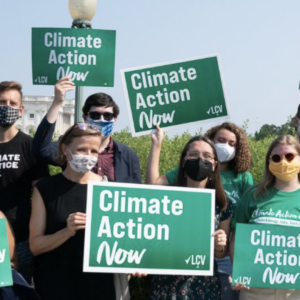It is no surprise the U.S. Supreme Court’s ruling overturning Roe v. Wade inspired passionate opposition from progressive groups and calls for aggressive action in response.
“Make no mistake, today’s decision is the result of a concerted decades-long right-wing effort to capture our courts and roll back the rights of women, girls, and all people who can become pregnant,” one progressive organization wrote. “Congress must act immediately and expand the number of justices who serve on our nation’s highest court.”
What may be surprising is who this statement came from: The League of Conservation Voters.
Why would a group dedicated to protecting nature and fighting climate change take sides in the abortion debate? Don’t pro-life voters care about the environment, too?
Not at the LCV. A review of its 2021 legislative scorecard shows votes on environmental issues made up about half of those used by the “green” group to evaluate lawmakers’ environmental records. For example, Rep. Chrissy Houlahan (D-Pa.) has a 100 percent score on the League’s “National Environmental Scorecard.” But that score includes votes to federalize elections, amnesty for illegal immigrants, and granting statehood to Washington, D.C.
American Conservation Coalition (ACC), a conservation organization that promotes free-market solutions to environmental problems, thinks this is the wrong approach.
“The one in particular that left me scratching my head was, according to the League of Conservation Voters, voting against a police reform bill by Sen. Tim Scott (R-S.C.) is the pro-environment position,” says Quill Robinson, ACC’s vice president of government affairs. “Sen. Scott was trying to address issues around police, and it got lots of support from many different people but that’s not a topic related to the environment.”
LCV said in a press release that Scott’s JUSTICE Act would “inadequately” address the need for comprehensive policing reform. “Black people have endured systematic racism and abusive policing practices for generations, but the mere incremental reforms and increased police funding of the bill fails to address the priorities of racial justice organizations.”
The statement makes no reference to the bill’s impact on climate change or the environment.
“It seems like LCV is really more of a Democratic front-group than (an) environmental group,” said Robinson. “I think that’s a real shame because there are important climate change issues and environmental issues and policies where Democrats and Republicans agree, but I think LCV is more intent on beating up Republicans and helping Democrats get re-elected than making real progress on environmental issues.”
LCV did not respond to repeated requests for comment. However, when it comes to mixing environmental protection with progressive culture-war politics, they’re hardly alone. Greenpeace, another group once focused on clean water and endangered species, has also embraced progressive activism, going so far as to blame energy companies for the January 6, 2021 riot at the U.S. Capitol.
“One thing the pandemic made clear is that we cannot tackle the climate crisis, economic inequality, and attacks on our democracy in isolation because they’re all intertwined,” said Seth Laxman, climate campaigner at Greenpeace USA. “Many of the same fossil fuel companies obstructing climate action also funded the seven senators who voted to overturn the presidential election and bolstered a violent, failed attempted coup on Jan. 6th.”
To build what Greenpeace considers “a more just, green, and peaceful future,” Laxman says we must address a system designed to concentrate power in the hands of a few.
“LCV’s decision to include items that may traditionally not be considered environmental or climate issues shows an understanding of the system change that needs to happen.”
How many LCV donors realize their contributions to fight climate change — the LCV received more than $34 million in donations in 2019 — are going to “protecting the U.S. Postal Service”? Or that more than $15 million went to candidates in 2020 based in part on their votes promoting unionization in the workforce?
Robinson says protecting the planet and working with legislators is important, but the ACC doesn’t use unrelated social issues as a litmus test for whether someone is good or bad for the environment.
“Frankly, we think that climate change and the environment are too important to make victims of (the) sort of culture war issues and partisan bickering,” he said.
This, says Robinson, is one of the reasons his organization exists.
“A lot of these Big Green groups like the LCV and the Sierra Club have spent more time and effort bashing Republicans and supporting Democrats than actually working on environmental issues,” says Robinson. “That’s an unfortunate turn of events that’s really accelerated over the last decade or so, and it’s a tragedy because it comes at the expense of real bipartisan progress on the environment.”
Many environmental groups say the Trump administration harmed the environment by promoting more oil and gas production, pulling the United States out of the Paris climate agreement, and changing the way the Endangered Species Act (ESA) is applied. Robinson counters that by pointing to Trump’s signing of the bipartisan Great American Outdoors Act. He adds that greenhouse gases fell during Trump’s time in office.
Today, many of the candidates backed by the LCV, like Houlahan, are publicly supporting increased fossil fuel energy production. And without any objections from the LCV.
“For a lot of these groups, President Trump getting elected, his four years in office were the best thing that ever happened. Today they were raising money hand over fist saying that ‘President Trump was the worst thing that ever happened to the environment,” says Robinson. “There are certainly many great environmental groups out there, but I would call out LCV and Sierra Club In particular, also Greenpeace, for frankly just being shills for the left rather than advocates for the environment.”
Please follow DVJournal on social media: Twitter@DVJournal or Facebook.com/DelawareValleyJournal

